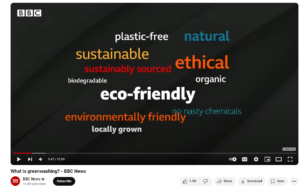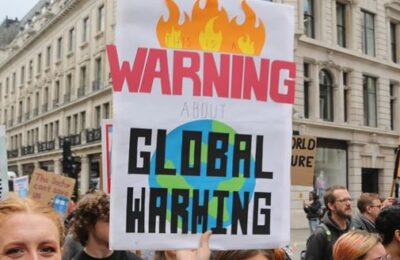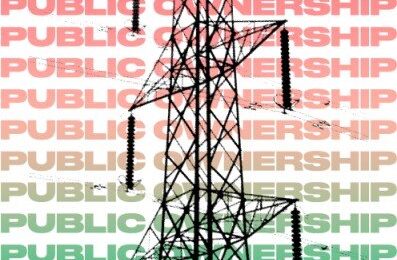 Sean Thompson writes:
Sean Thompson writes:
The BBC, as a public service broadcaster, has always claimed to uphold the highest standards of integrity and truthfulness, along with a rigorous commitment to fact based reporting. In particular, the BBC is committed to science-led climate reporting and in 2021, at COP 26 in Glasgow, the Beeb was one of 12 British and Irish broadcasters to sign the Climate Content Pledge, promising to do “more and better climate story-telling on screen across all genres.” The signatories pledged that “We will ensure that our efforts are informed by the science” and that “We will reach more of our audiences with content that helps everyone understand and navigate the path to net zero, and inspires them to make greener choices”.
However, the Beeb’s commitment doesn’t seem to extend to its commercial arm, BBC Studios, which generated £1.8 billion for the corporation in 2023/4. StoryWorks is part of BBC Studios, and produces videos, podcasts, and articles paid for by commercial clients, which it publishes on BBC broadcast channels outside the UK and on the BBC website – the most viewed news platform in the world. StoryWorks has made dozens of films for oil and gas companies, international food and farming corporations, petrostates, and high-emission transport firms in recent years and is continuing to do so.
Storyworks has produced content for many of the corporations that dominate the international food, drink and agriculture markets, including Nestlé, the pesticides giants Bayer and Corteva. For example, in 2023 it produced a film for Nestlé, the world’s largest food and drink company bigging up the company’s efforts to support sustainable farming through ‘regenerative agriculture’. The film, Farming’s next generation failed to mention that, according to a report from the Changing Markets Foundation, in 2022, Nestlé (whose annual CO2 emissions of 87.5 million tonnes are slightly larger than the whole of of Chile’s at 84.8 million tonnes) – spent 14 times more on “marketing and administration” in the last year than it did on regenerative agriculture over the previous five years combined.
The Nestlé film was part of a ‘Food for Thought’ series backed by the trade body FoodDrink Europe, whose members include major polluters like Cargill, Coca-Cola, and Unilever. Of course, if you look for the film on YouTube you will find right at the end the statement that it was ‘Paid and presented by Nestlé, as part of the Food for Thought series presented by FoodDrinkEurope’ and Nestlé’s logo is inconspicuously displayed – for 3 seconds – at the end of the film, alongside the familiar, and prestigious logo of the BBC.
Statements like that are of course to be found tucked away at the end of virtually all of Storyworks’ films, rather like the ‘Advertising Feature’ notices at the top of the pages of advertorial inserts slipped into copies of ostensibly reputable newspapers – but in reality they are there simply to provide the Beeb with plausible deniability. Despite such films having the high production values and high professional quality one expects from BBC documentaries and despite their broadcast on BBC’s channels, the corporation seeks to deny responsibility for the distortions and misinformation they contain by claiming that they are simply providing technical services and that the content is the responsibility of their corporate clients.
And what corporate clients! In 2021, Storyworks launched a series entitled ‘Humanising Energy’ which, like the second series in 2023, consisted of several dozen five minute films showing the ‘green innovations’ being introduced by various corporate players. These
included Boeing, the energy and chemicals company Sasol and the gas company Linde, whose films advocating for the development and deployment of ‘sustainable’ aviation fuels, fossil fuel companies Engie Brazil, Gasum (the biggest distributor of LNG in the Nordic countries), CLP Holdings (which has said it won’t phase out its coal assets before 2040, Invenergy, the energy services firm Voith, and the engine manufacturer Cummins. All of these films lauded the supposed climate credentials of the featured companies, without a word about their contribution to global emissions or the viability of their touted technologies.
But it’s not just international corporations that the BBC’s commercial arm shills for. Over the years, Storyworks has produced films promoting many of of the world’s leading petrostates, most of which have a poor record on human rights and press freedom.
For example, it has produced content promoting the United Arab Emirates (UAE), which has a long and continuing record of imprisoning critics of its monarchic rulers, including activists, academics, and lawyers and UAE authorities also continue to discriminate against women, LGBTQ communities, and migrants. In 2023, the studio produced a podcast series on behalf of Abu Dhabi Tourism, ‘highlighting the message that Abu Dhabi [the capital of the UAE] is a destination for every kind of traveller’. According to the BBC the series ‘challenged preconceived notions and positioned the city as a cultural gem worth exploring’ and was downloaded 115,000 times.
Azerbaijan is an authoritarian state with little effective political opposition which has been heavily criticised by Human Rights Watch. Over the past year, Storyworks has produced several adverts promoting Azerbaijan as a place to visit, while not mentioning the country’s plan to expand fossil fuel production by a third over the next decade, which flouts globally agreed efforts to limit rising temperatures.
In Kuwait, the country’s personal status laws discriminate against women in matters of marriage, divorce and child custody. Its censorship laws prohibit journalists from criticising the government, the emir, the ruling family, its allies or religion and, according to Reporters Without Borders, it’s ‘difficult for journalists to tackle migrant worker rights, women’s rights and corruption.’ Despite this, StoryWorks has frequently promoted the country. For example, last December the studio produced an advert for the country’s state-run development agency, the Kuwait Fund, boasting of its efforts to help ‘disadvantaged regions, women and minorities’.
Transport produces around a quarter of all energy related greenhouse gas emissions globally, while air pollution is estimated to cause over 3.2 million premature deaths worldwide every year. However, StoryWorks has been greenwashing many of the major polluting firms driving the climate crisis by obscuring their role in generating that pollution and promoting their preferred ‘solutions’, no matter how discredited. For example, in 2022 Europe’s cruise ships emitted as much sulphur oxides as a billion cars, yet this year StoryWorks produced an advertising campaign for the poshest of the cruise companies, Cunard. When it comes to road transport, it produced a series paid for by the Indian multinational motorcycle company Royal Enfield as well as producing adverts for Hyundai, Volkswagen,Jaguar and Lexus. And although aviation contributes approximately 2.5 percent of worldwide greenhouse gas emissions,
StoryWorks has produced content for a number of airlines; Korean Air (2017), China Southern Airline (2022) and more recently, Uzbekistan Airways (2024).
StoryWorks says that it ‘operates entirely separately from the BBC’s editorial operations’ and that its output ‘is clearly labelled as commercial content’. However, research has shown that labelling doesn’t always work – a study by Boston University found that only one in 10 people recognised paid for content promoting the interests of the programme sponsors as advertising rather than independent reporting.
In an interview with the DeSmog website, former senior BBC journalist Patrick House said that ‘Those commissioning and paying for this content are deliberately using the BBC’s brand to greenwash or whitewash their own reputations. It’s an exercise of cynical manipulation…Commissions like this are lucrative and therefore attractive to a corporation that has been deliberately and severely financially squeezed by the UK government over a long period. This has forced the BBC to seek money from wherever it can find it, and this poses a risk to its editorial independence and honesty, which will ultimately undermine the trust of the BBC’s audience…Accepting money from sources like this, to make content like this, risks undermining the BBC’s own hard-won reputation and will ultimately put it on the wrong side of history…This is a huge disservice to the BBC’s audiences, and a betrayal of the many brave and conscientious BBC journalists around the world who see holding power to account and telling the truth as their raison d’etre.’



